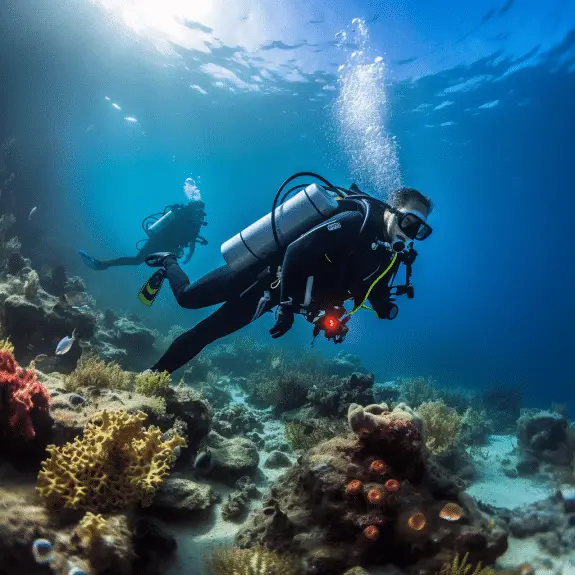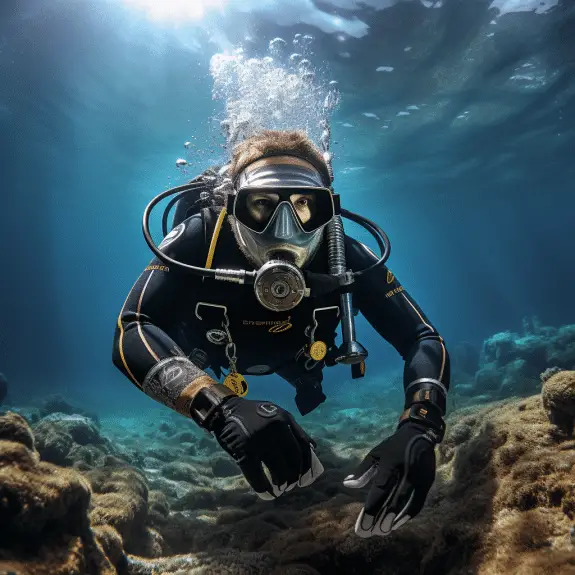Scuba diving is an exciting and exhilarating experience that allows you to explore the beautiful and mysterious underwater world. However, it also comes with potential dangers and risks that all divers must be aware of. As a professional journalist in the scuba diving world, I feel it is my duty to educate and inform divers of the hazards that come with this thrilling activity, so they can enjoy it safely.
When diving, you’re venturing into an environment where you naturally don’t belong. This means that certain risks come with the territory. These risks can range from minor inconveniences to life-threatening emergencies and can be caused by a variety of factors such as human error, equipment malfunction, or even the marine life you encounter.
Key Takeaways:
- Scuba diving presents several potential dangers and risks that divers should be aware of.
- The risks can range from minor inconveniences to life-threatening emergencies.
- Factors such as human error, equipment malfunction, and marine life encounters can all contribute to the dangers of scuba diving.
- Understanding the risks associated with scuba diving is crucial for divers to take the necessary precautions and ensure their safety.
- As a professional journalist in the industry, I feel it is my duty to educate and inform divers about the potential hazards of scuba diving.

Common Scuba Diving Hazards
Scuba diving is a thrilling and awe-inspiring experience that allows divers to explore the majestic underwater world. However, it comes with risks that should not be taken lightly. In this section, we will discuss the most common hazards divers may encounter while scuba diving. Understanding these hazards is crucial for divers in order to minimize the risks and enjoy a safe and enjoyable dive.
Underwater Hazards
The underwater environment presents numerous hazards that divers should be aware of. Strong currents, sharp rocks, and unpredictable weather conditions are just a few examples of the potential dangers divers may face. To avoid these hazards, divers should always check the conditions before the dive, know their limits, and stay within their level of experience.
Equipment Failure
Equipment failure is another common hazard that divers may encounter. Malfunctioning regulators, leaking hoses, and broken tanks can lead to dangerous situations if not detected and addressed promptly. Before diving, it is crucial to check all equipment and ensure it is functioning correctly. If any problems are detected, the equipment should be repaired or replaced before the dive.
Decompression Sickness
Decompression sickness, also known as “the bends,” is a potentially life-threatening hazard that can occur when divers ascend too quickly or do not follow proper decompression procedures. Symptoms may include joint pain, headache, paralysis, and even death. To prevent decompression sickness, divers should follow proper dive tables, ascent rates, and decompression stops.
Marine Life Encounters
Encounters with marine life can be an unforgettable experience for divers. However, some marine creatures can be dangerous and potentially lethal. Sharks, jellyfish, and poisonous fish are just a few examples of the marine life hazards that divers may encounter. To minimize the risks, divers should respect the creatures’ habitat, keep a safe distance, and avoid touching or disturbing any marine life.
By understanding and respecting the potential hazards, divers can confidently enjoy the wonders of the underwater world. Proper training, safety protocols, and preparation are essential for minimizing the risks and ensuring a safe and enjoyable dive for all.
Safety Measures and Tips for Scuba Diving
As a scuba diver, safety is a priority. Here are some tips to help minimize the risk of diving accidents and respond appropriately to emergencies:
Prepare for Diving Emergencies
Accidents and emergencies can happen while scuba diving, such as running out of air, losing sight of your dive buddy, or encountering a marine animal. Be prepared by:
- Carrying a dive knife or shears to cut entangling fishing lines or vegetation
- Having a signaling device like a whistle or safety sausage to attract attention
- Familiarizing yourself with first aid procedures and emergency protocols for your dive excursion
- Checking your equipment for functionality before diving
Master Essential Diving Skills
Learning and practicing essential diving skills can help divers mitigate the risk of accidents and emergencies. These skills include:
- Clearing your mask and regulator of water
- Controlling buoyancy to avoid collisions with marine life or objects
- Performing safety stops to prevent decompression sickness
- Planning dives and monitoring air supply and depth regularly
Be Mindful of Diving Accidents
Despite taking safety precautions, diving accidents can still occur. The most common diving accidents include:
“Decompression sickness, arterial gas embolism, and pulmonary barotrauma are the most common diving accidents. They can be prevented by following established diving protocols and seeking medical help immediately if symptoms occur.”
Dive with a Buddy and Follow Established Protocols
Never dive alone. Always have a dive buddy, and stay close together throughout the dive. Follow established diving protocols, including the buddy system, dive limits, and ascent rate.
By following these safety measures and tips, divers can enjoy the incredible experience of scuba diving while minimizing the risks associated with it.
Safety Measures and Tips for Scuba Diving
As a professional scuba diving journalist, I understand that scuba diving can be an exciting and adventurous activity. However, it is crucial to ensure safety while diving. Here are some safety measures and tips to keep in mind:
Get Certified
Before diving, it is essential to be certified. Certification ensures that the diver has completed the necessary training and has the required knowledge of safety protocols. Without proper certification, divers risk accidents, injuries, and even death.
Never Dive Alone
Diving should never be a solo activity. It is recommended to have a buddy system where divers dive in pairs to look out for each other and respond to emergencies if they occur. Additionally, diving with a more experienced diver can be helpful in learning safety techniques and avoiding potential hazards.
Plan and Prepare
Before diving, divers should plan and prepare for the dive, including checking equipment, understanding the dive location, and considering weather and water conditions. Familiarizing oneself with potential risks and hazards, such as marine life encounters, can prevent accidents and emergencies.
Communicate Effectively
Communication is key while scuba diving. Divers should establish clear communication signals with their dive buddy to indicate if there are any problems or issues. It is also crucial to listen to instructions given by the dive guide or instructor.

Stay Within Limits
Diving beyond one’s ability and experience level can lead to accidents and emergencies. Divers should stay within their limits and avoid pushing themselves too hard. Additionally, divers should monitor their air supply and adhere to depth and time limits to prevent decompression sickness.
By following these safety measures and tips, scuba divers can enjoy the wonders of the underwater world while minimizing the risks of accidents and emergencies.
FAQ
How is scuba diving dangerous?
Scuba diving can be dangerous due to various factors such as decompression sickness, equipment failures, and underwater hazards. It is important for divers to understand these risks and take appropriate precautions to ensure their safety.
What are the common hazards of scuba diving?
Some common hazards of scuba diving include decompression sickness, equipment failures, marine life encounters, and underwater navigation difficulties. Divers should be aware of these dangers and be prepared to handle them.
What safety measures and tips should I follow while scuba diving?
To ensure safety while scuba diving, it is recommended to dive with a buddy, maintain proper buoyancy control, follow dive plans and depth limits, regularly check equipment, and stay updated on emergency procedures. Additionally, ongoing training and certification are essential for safe diving.
How can I handle different diving scenarios and emergencies?
In case of emergencies such as equipment failures, lost buddy, or run out of air situations, it is important to remain calm, rely on your training, and utilize emergency procedures. Proper communication and problem-solving skills are crucial for managing different diving scenarios.
What should I do if I encounter marine life while scuba diving?
When encountering marine life while scuba diving, it is important to maintain a safe distance, avoid touching or disturbing the animals, and respect their natural habitat. Follow the guidelines provided by your dive instructor or local marine life conservation organizations.
